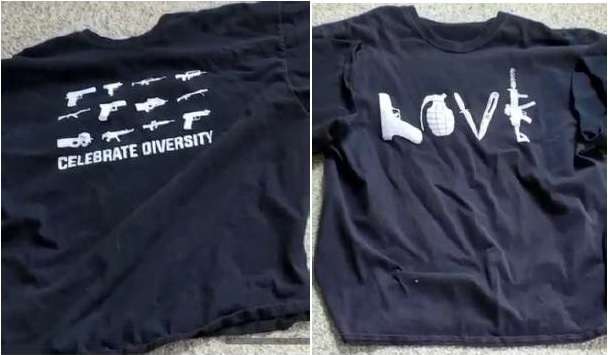The Volokh Conspiracy
Mostly law professors | Sometimes contrarian | Often libertarian | Always independent
Right to Wear T-Shirts That Depict or Mention Guns
... extends to public high school students, holds a federal judge in Wisconsin.
Markesan High School student Matthew Schoenecker wore these two shirts to school:

He also wore one that "contains no images of weapons but displays text reading 'IF GUNS KILL PEOPLE, I GUESS PENCILS misspell words CARS drive drunk & SPOONS make people fat.'"
Schoenecker was told that he could not wear T-shirts that either depict weapons or even mention the word "gun." The school dress code bans
Clothing or articles displaying obscenities, suggestive slogans and/or images, nudity, gangs, crime, violence, occult worship, slanderous or harassing material, encouragement of disruptive behavior, weapons, beer/alcohol, tobacco, marijuana or other drug designs are prohibited.
Likely unconstitutional, said U.S. District Judge Lynn Adelman, in Schoenecker v. Koopman, decided Friday, granting a preliminary injunction blocking the school from enforcing the rule against Schoenecker. The T-shirts contain presumptively protected speech, the judge held, notwithstanding the school's argument that the first two shirts "do not convey specific, unambiguous messages." Because the images on the shirts "are pure speech, in that they contain images and words that convey a message," they are presumptively covered by the First Amendment even if they are "ambiguous and open to interpretation," and lack "a narrow, succinctly articulable message."
And this presumption wasn't rebutted by a sufficient showing of "likely … substantial disruption" (the Tinker v. Des Moines Indep. School Dist. Standard):
To show that he reasonably believed that the T-shirts would be likely to cause substantial disruption, the defendant [principal] cites the following facts. First, he states that staff members working at the school told him that the shirts "made them uncomfortable and concerned about school safety," especially because the plaintiff wore the shirts shortly after the shooting at Marjory Stoneman Douglas High School in Parkland, Florida. Second, he notes that some students at Markesan High School participated in a walkout to protest school gun violence and to remember the 17 victims killed in the Parkland shooting, and that some Markesan students in general are concerned about a shooting occurring at their school. Third, the defendant states that "class instruction was disrupted on multiple occasions due to student discussions and arguments about the [plaintiff's] shirts." Finally, the defendant states that, after the plaintiff filed this lawsuit and news outlets came to the school to interview him, students became distracted by the news crews and had disruptive discussions during class about the media presence.
This last reason clearly does not support the defendant's position that the school may censor the plaintiff's speech. Any disruption related to the media presence on campus was not caused by the plaintiff's shirts, but by the defendant's decision to censor the shirts and the ensuing lawsuit. The media would not have taken an interest in the plaintiff's conduct had the defendant simply allowed the plaintiff to continue wearing the shirts.
So even if the media presence qualifies as a substantial disruption, the disruption cannot be attributed to the shirts themselves. Moreover, there is no reason to think that the media will continue visiting the school if the plaintiff is allowed to start wearing the shirts again.
The defendant's remaining three reasons support his decision to ban the shirts, but only slightly. As far as the record reveals, no students felt threatened by the plaintiff's shirts. Yes, some students were concerned about school shootings in general, but no evidence suggests that the plaintiff's shirts contributed to any student's anxiety. The evidence is that the actual school shooting in Parkland, Florida was what prompted the students' concerns.
The defendant tells us that the plaintiff's shirts made some staff members uncomfortable and concerned about school safety, but there is no evidence that any staff member's ability to provide instruction to students was affected. Moreover, the staff members' reaction to the shirts seems unreasonable, as none of the shirts promote gun violence.
The defendant also states that class instruction was "disrupted" on multiple occasions "due to student discussions and arguments about the shirts." But he does not elaborate on this statement by explaining exactly what happened, so it is hard to infer that the disruption was substantial or that it would be reasonable for the defendant to forecast that additional such disruptions will occur if the plaintiff is allowed to continue wearing the shirts.
Quite right, I think, and consistent with Newsom ex rel. Newsom v. Albemarle County School Board (4th Cir. 2003), a federal appellate case that reached the same result on similar facts.
Judge Adelman, by the way, argued on behalf of the defendant in Wisconsin v. Mitchell (1993)—the case in which the Supreme Court upheld the constitutionality of hate crimes enhancements (though of course not of "hate speech" rules)—and later cowrote a law review article criticizing that decision. He was also a Democratic State Senator in Wisconsin for 20 years, before being appointed to the bench by President Clinton.


Show Comments (132)